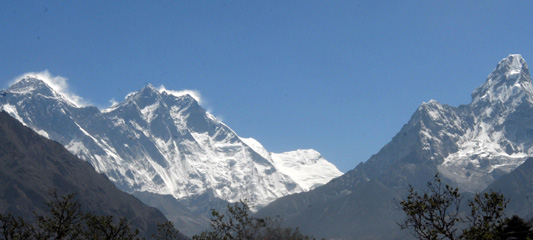Everest stays in torch route
Chinese officials refuse to withdraw Mount Everest from the Olympic torch relay.

 |
| Mount Everest will become the focus of the Beijing protests [EPA] |
Chinese Olympic officials have confirmed the Olympic torch relay route in Tibet and to the top of Mount Everest will not be changed despite the recent protests in Lhasa.
Anti-government riots in the Tibet capital of Lhasa last week and a resultant crackdown by authorities has led to calls by Tibet activist groups to stop the relay from going through the region before the Beijing Summer Olympics.
However Jiang Xiaoyu, executive vice president of the Beijing organizing committee, said that the ascent to the top of Mount Everest would be the “highlight” of the torch relay and “a great feat in Olympic history.”
“The Tibet leg of the torch relay will proceed as scheduled,” Jiang said.
“We firmly believe that the government of the Tibet Autonomous Region will be able ensure the stability of Lhasa and Tibet and also be able to ensure the smooth going of the torch relay in Tibet.”
Boycott unlikely
The riots, which the self-declared Tibetan government-in-exile, says has a death toll is as high as 80, have cast a spotlight on China’s human rights record, although there have been no calls by governments or international sports officials for a boycott of the Games.
Jiang said climbers would take the Olympic flame to Everest’s 8,850-metre summit on a day with favorable weather conditions in May.
He said local police and governments would provide security along the relay route.
Mount Everest is in the border region between Nepal and Tibet.
China has already begun denying mountaineers permission to climb the Tibetan side of the mountain this spring, a move that reflects government concerns that activists may try to disrupt it torch plans.
Even before the riots, taking the torch to the top of Mount Everest was shaping up to be among the more controversial events of an already politicised Games.
The relay touches one of China’s more sensitive issues: its 57-year-rule over Tibet.
Disputed territory
Beijing says Tibet is historically part of China, but many Tibetans argue the Himalayan region was virtually independent for centuries and accuse China of trying to crush Tibetan culture by swamping the region with people of China’s majority Han ethnic group.
Tibetan activist groups have criticised the Olympic torch run up Everest as an attempt by China to legitimize its control of Tibet.
Activists have in the past unfurled banners at the Everest base camp and the Great Wall of China calling for Tibet’s independence.